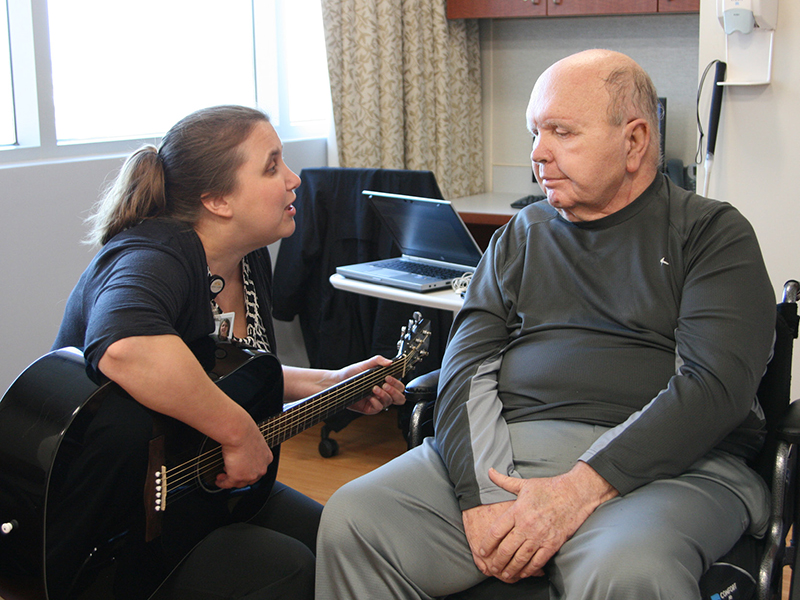Three years after suffering a stroke, Jim Bob Rodriguez could barely speak, except to say his name.
Then he met music therapist Tracy Bowdish.
By the end of their first session, Bowdish had him saying hello. Within a few months, he was saying “I love you” to his wife, Sandy. Nearly a year later, he’s singing and asking for Dr. Pepper.
“From nothing to that in less than a year is amazing to me,” says Sandy Rodriguez, her voice full of emotion after watching her husband sing “Swing Low, Sweet Chariot” in a weekly therapy session.
She says she owes it all to Bowdish, a music therapist at the Sentara Music and Medicine Center. The center, located at the Sentara Heart Hospital in Norfolk, Virginia, is just over two years old but already making enormous strides in helping patients in the hospital.
Music therapy is just one part of the music medicine program, which uses music in various ways throughout the hospital to help patients. There are piano concerts held in the lobby, musicians who play to patients on the floors and even an artist in residence program.
“The arts play a big factor in improving the outcome of disease,” says Dr. Kamal Chémali, the Cleveland Clinic-trained neurologist who runs the music medicine program. “We want to transform this place into a place where people can find as much normalcy as possible in a high-stress environment.”
For Bowdish’s patients, who usually have suffered some neurological trauma, normalcy is about re-learning to communicate with others. During her sessions, she uses music and rhythm to teach words and phrases—and songs. A stroke patient who could hardly speak can come out of one session singing.
The science behind music therapy is simple: When you sing, you use more of your brain than when you speak. The brain processes the music in a unique way, creating novel neuronal networks and rewiring the brain.
A stroke patient, when prompted, might not be able to find the words to simply speak. But play part of an old familiar song, like “Twinkle, Twinkle Little Star” or “Take Me out to the Ball Game,” and the words will come tumbling out, Bowdish says.
“Music affects emotions, which affect our memories,” Bowdish says. “It’s such a trigger for our long-term memories.”
Patients who have shown little improvement with other types of therapy often make strides with music therapy. Bowdish, who holds sessions at Sentara hospitals, will soon be expanding the program to a Virginia Beach, Virginia, nursing home to help dementia patients.
During a recent music therapy session, Bowdish sat close to Rodriguez—who is hard-of-hearing—in his wheelchair. Holding her guitar, she asked him to choose between two songs: “I Walk the Line” by Johnny Cash or “Amazing Grace.” Rodriguez chose the former, and Bowdish began to play and sing.
His eyes on Bowdish as she sang, Rodriguez joined in as she reached the refrain, clearly singing, “Because you’re mine, I walk the line.”
Before his stroke, Rodriguez loved to sing. He was in a men’s quartet and a men’s choral group, and sang every week at Fairmont Park United Methodist Church in Norfolk. After the stroke, he stopped singing. But after working with Bowdish, he now sings along in church again.
At home, Rodriguez can communicate so much better with his wife, using phrases like “I’m hungry,” “I’m cold,” and “I would like a Dr. Pepper.” Bowdish taught him to say “I love you, Sandy,” and is working on “Happy Anniversary” with him as the pair approaches their 45th wedding anniversary.
Singing helps with the phrases, too—Bowdish first sings, then speaks phrases rhythmically, tapping the words on a patient’s hand. Repetition is key—caretakers are asked to continue at home, and Bowdish supplies them with CDs or digital files to speak and sing along with.
She can even help patients walk.
Stroke victim Dorothy Andrews was slowly recovering, relearning to talk as a patient of Bowdish’s, when her daughter asked for help with walking. Bowdish supplied two upbeat, instrumental ragtime songs to practice walking to—and it works, says Andrews’ daughter, Debra Livelli.
Her 80-year-old mother, who a year ago was given a bleak diagnosis after her stroke, now struts up and down the hallway of their Virginia Beach home walking with hardly a limp.
“I can’t say enough about Tracy,” says Livelli. “She has a magic gift.”

